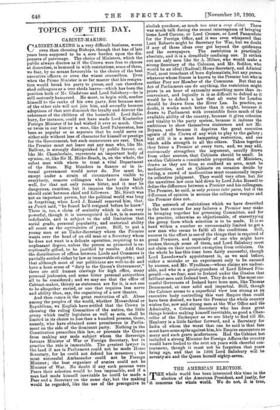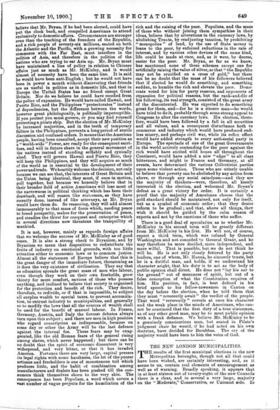THE AMERICAN ELECTION. T HE whole world has been interested this
time in the election of the American President, and justly, for it concerns the whole world. We do not, it is true,
believe that Mr. Bryan, if he had been elected, could have put the clock back, and compelled Americans to attend exclusively to domestic affairs. Circumstances are stronger even than the teaching of the founders of the Republic, and a rich people of seventy-six millions, seated on both the Atlantic and the Pacific, with a growing necessity for commerce with the Far East, must interfere in the politics of Asia, and therefore in the politics of the nations who are trying to eat Asia up. Mr. Bryan must have maintained a line of policy in relation to Chinese affairs just as much as Mr. McKinley, and it would almost of necessity have been the same line. It is said he would have been anti-English ; but he would not have been in power a month without discovering that friends are as useful in politics as in domestic life, and that in Europe the United States has no friend except Great Britain. Nor do we believe he could have receded from the policy of expansion. He would have called Hawaii, and Puerto Rico, and the Philippines " protectorates " instead of dependencies, but the difference between the words, however great philologically, is politically imperceptible. If you protect you must govern, or you may find yourself protecting a pirate ship. But the election of Mr. McKinley by increased majorities, and in the teeth of temporary failure in the Philippines, prevents a long period of sterile discussion and confused orders. It means that the American people, having been consulted, accept their new position as a " world-wide " Power, are ready for the consequent sacri- fioes, and will in future share in the general movement of the nations instead of standing selfishly and cynically aloof. They will govern Hawaii and Puerto Rico, they will keep the Philippines, and they will acquire so much of the world as is essential to the development of their power and trade. We heartily welcome the decision, not only because we can see that, the interests of Great Britain and the Union being identical, they must, if once in motion, pull together, but because we honestly believe that in their broader field of action Americans will lose most of the narrowness in political thinking which has been their drawback, and will reason like statesmen, as they have recently done, instead of like attorneys, as Mr. Bryan would have them do. So reasoning, they will add almost immeasurably to that mass of force which, needing peace to breed prosperity, makes for the preservation of peace, and steadies the thirst for conquest and enterprise which in several directions now threatens the tranquillity of mankind.
It is not, however, mainly as regards foreign affairs that we welcome the success of Mr. McKinley as of good omen. It is also a strong check to Bryanism, and by Bryanism we mean that disposition to redistribute the fruits of industry on emotional grounds, with too little attention either to economic laws or to common justice. Almost all the statesmen of Europe believe that this is the great danger of the immediate future, threatening as it does the very existence of civilisation. They say that as education spreads the great nines of men who labour, even though they work on their own freeholds, grow thirsty for more comfort, envious of those who possess anything, and inclined to believe that society is organised for the protection and benefit of the rich. They desire, therefore, to redivide, or if that is impossible, to subject all surplus wealth to special taxes, to prevent accumula- tion, to entrust industry to municipalities, and generally so to modify the laws that all the sources of wealth shall be used for the benefit of manual labour. In France, Germany, Austria, and Italy the fiercest debates always turn upon this subject ; and there are men in high position who regard conscription as indispensable, because on some day or other the Army will be the last defence against the internal foe. These fears may be exag- gerated, like the old Roman fears of the general rising among slaves, which never happened ; but there can be no doubt that the spirit of economic discontent is very widespread, and very bitter, or that it has invaded America. Fortunes there are very large, capital presses its legal rights with some harshness, the lot of the poorer artisans and freeholders is one of monotonous toil which produces little, and the habit of combination among manufacturers and dealers has been pushed till the con- sumers think themselves shorn to the very skin. The consequence has been Populism, a word which covers a vast number of vague projects for the humiliation of the rich and the raising of the poor. Populists, and the mass of those who without joining them sympathise in their ideas, believe that by alterations in the currency laws, by abolishing Trusts, by readjusting taxation, by prohibiting " monopolies " of land, by the use of State money in loans to the poor, by enforced reductions in the rate of interest, and by various other devices of the same kind, life could be made at once, and, as it were, by decree, easier for the poor. Mr. Bryan, so far as we know, has sanctioned none of these schemes except one for artificially raising the value of silver, so that " the Republic may not be crucified on a cross of gold," but there can be no doubt that the mass of his followers believed that if elected he would do something, and something sudden, to humble the rich and elevate the poor. Demo. crats voted for him for party reasons, and opponents of expansion for political reasons, but the rank-and-file of his following, its real strength, consisted of the great army of the discontented. He was expected to do something great for them, and—for he is a sincere man—he would have tried to do it, probably through some strong appeal to Congress to alter the currency laws. His election, there- fore, would have been followed by a fall in all securities and all values, and a consequent disturbance both to commerce and industry which would have produced end- less misery, and perhaps civil war, while its reflex effect would have added strength to every anti-social party in Europe. The spectacle of one of the great Governments in the world actively contending for the poor against the rich would have excited wild hopes all throughout the Continent, would have added a new " edge" to all class bitterness, and might in France and Germany, at all events, have determined the various Collectivist parties upon some violent action. Those who are utterly unable to believe that poverty can be abolished by any action from above, or through any social cataclysm—and they are the majority of thinkers—were, therefore, all keenly interested in the election, and welcomed Mr. Bryan's defeat as a great victory for order. It is certainly a proof that the majority of Americans choose that the gold standard should be maintained, not only for itself, but as a symbol of economic order ; that they desire reform to be gradual ; and that, above all things, they wish it should be guided by the calm reason of experts and not by the emotions of those who suffer.
There is a good deal of speculation as to whether Mr. McKinley in his second term will be greatly different from Mr. McKinley in his first. He will not, of course, expect a third term, which was refused by General Washington and not conceded to General Grant, and he may therefore be more decided, more independent, and more wilful. That is possible, but we do not think he will be. He is not only closely fettered by the party leaders, one of whom, Mr. Hanna, he sincerely trusts, but he is a dutiful man, and holds, if we understand his character aright, that his duty is to act as the body of public opinion shall direct. He does not "lay his ear to the ground" out of meanness of spirit, but out of a false conception of what the Constitution requires of him. His position, in fact, is best defined in his brief speech to his fellow-townsmen in Canton on the day before the election, when he told them that they must " reverently await" the verdict of the people. That word " reverently " reveals at once his character and the weak place in the minds of Americans, who can- not be convinced that the first duty of a true statesman, as of any other good man, may be to meet public opinion with a frank defiance. We believe Mr. McKinley to be a genuinely conscientious man, but seated in Pilate's judgment chair he would. if he had acted on his own doctrine, have decided for Barabbas. The cry of the majority would have been to him the voice of God.







































 Previous page
Previous page